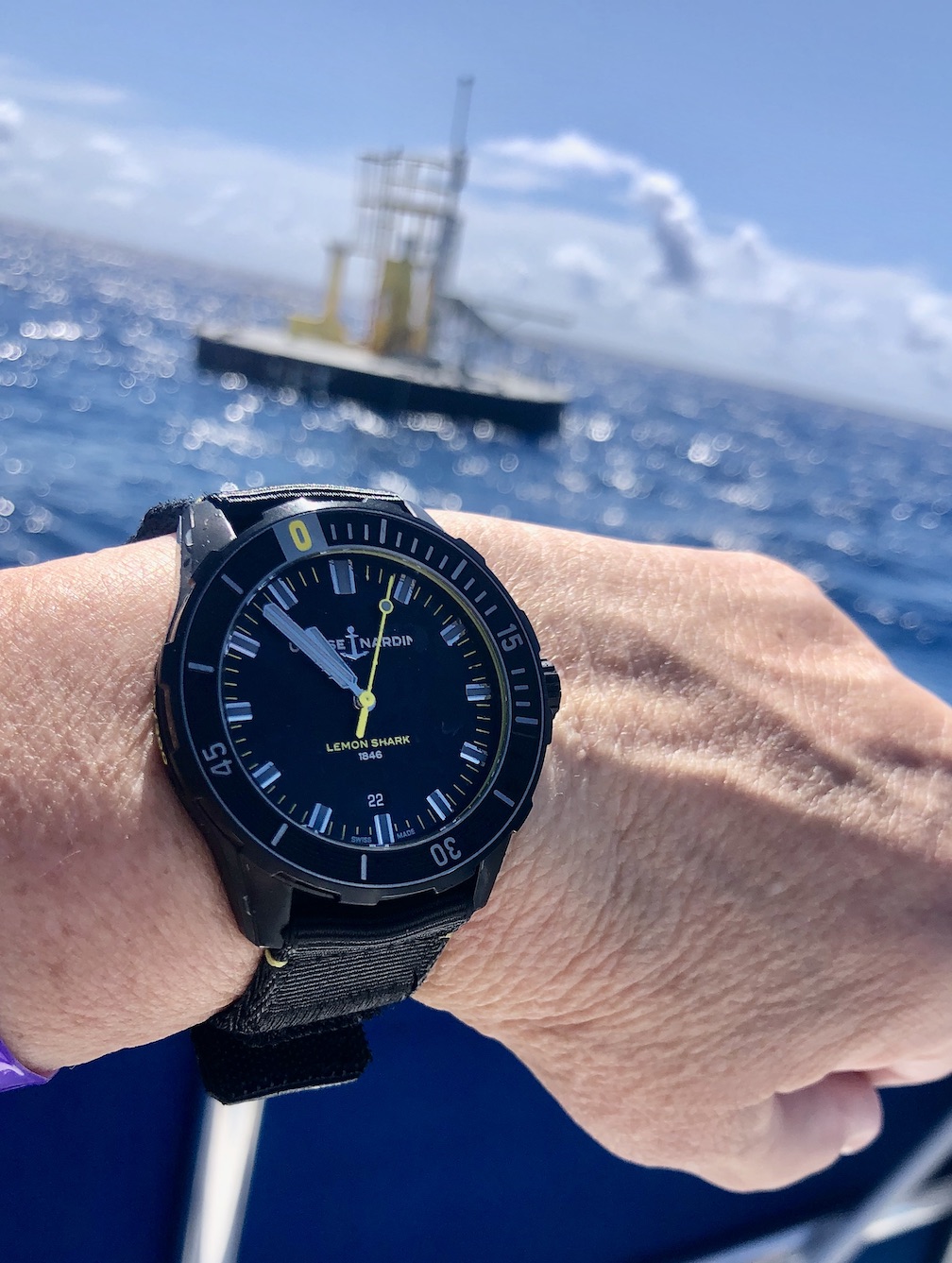
Ulysse Nardin Diver Lemon Shark watch with Medina Aquarius bouy in the background. That buoy provides oxygen, electricity and internet to the world’s only remaining underwater lab in existence. We snorkeled there with the brand, FIU and Ocearch.
Swiss watch brand Ulysse Nardin continues its work to improve our oceans and the abundance of life there with new and continued cooperative efforts. In fact, the brand has been working with Ocearch for just over a year now, and as an offshoot, recently also teamed with the Medina Aquarius Program of Florida International University (FIU) to take marine study and education to the next levels. It also recently unveiled the new Diver Lemon Shark watch to honor this gentle shark. The release of the watch took place in the Florida Keys on a snorkeling trip that brought together a few select journalists, Ulysse Nardin brand executives, FIU’s marine team and the Ocearch team. Here, we break down Ulysse Nardin’s powerful messages.
Ulysse Nardin Diver Lemon Shark Watch
Underscoring its commitment to shark conservation around the world, Ulysse Nardin also uses World Oceans Day to unveil its newest dive watch: the Diver Lemon Shark edition. The 42mm watch features a black dial with lemon yellow accents that pay homage to the lemon shark, which is indigenous to the Florida Keys. Powered by the state-of-the-art Ulysse Nardin caliber UN-816 mechanical movement, the watch is water resistant to 300 meters. It boasts a case back with three lemon sharks engraved on it and is fittingly finished with the brand’s R-Strap, made from recycled fishing nets. Just 300 pieces will be made, each retailing for $7,300.
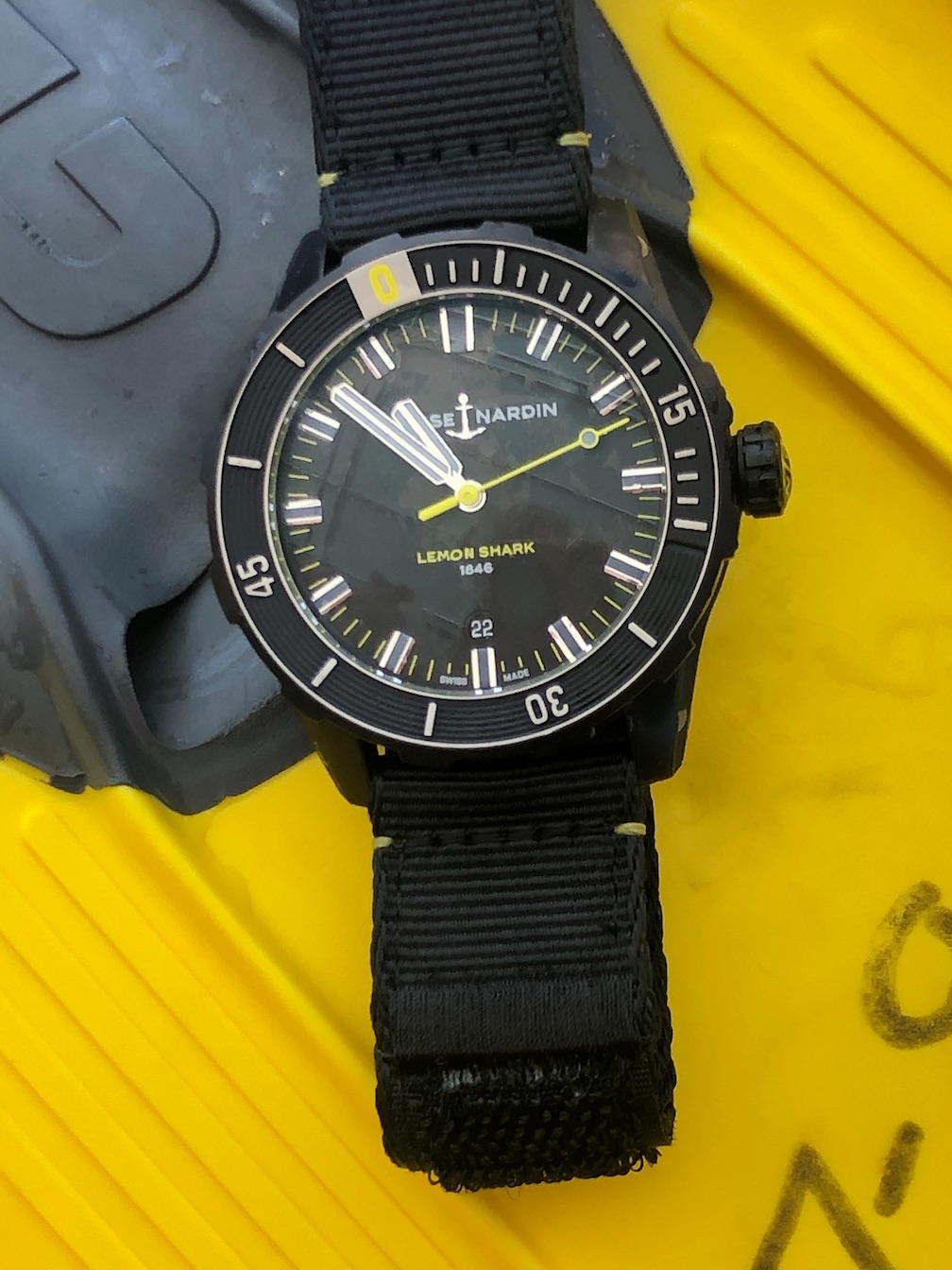
Ulysse Nardin Diver Lemon Shark boasts thee engraved lemon sharks on the case back and is fitted with the brand’s R-strap made from recycled fishing nets.
Ulysse Nardin has always focused on marine chronometers and even supplied watches to naval forces in America and other countries. It comes as no surprise, then, that the brand would be vitally concerned with the health of the world’s oceans, which cover 70 percent of the planet. With half of Earth’s oxygen produced by the ocean, and the incredible biodiversity found in the seas that sustain and feed people globally, the oceans are a bastion in need of protection. According to the United Nations, which deems today World Oceans Day 2021, approximately 90 percent of the big fish population has been depleted, coral reefs are being destroyed, and other forces prove to be consistent challenges to the seas.
Ulysse Nardin and Ocearch
Ulysse Nardin, who’s advertising and marketing campaigns disruptively feature sharks, joined forces with Ocearch in 2020 to help support the non-profits efforts to raise awareness of the importance of sharks in the marine ecosystem, and to help educate people about the facts rather than the myths behind these creatures. Ulysse Nardin embarked on its first expedition with Ocearch in August of 2020, where a team of scientists headed off the coast of Massachusetts to capture, study and release great white sharks in their own environment. The apex predators are in charge of regulating the ocean ecosystems and ensuring abundance. The end goal is multi-fold, including saving the world’s shark population and, in the process, taking samples from sharks to study what medical benefits their bacteria and subsequent antibodies could bring to human life.
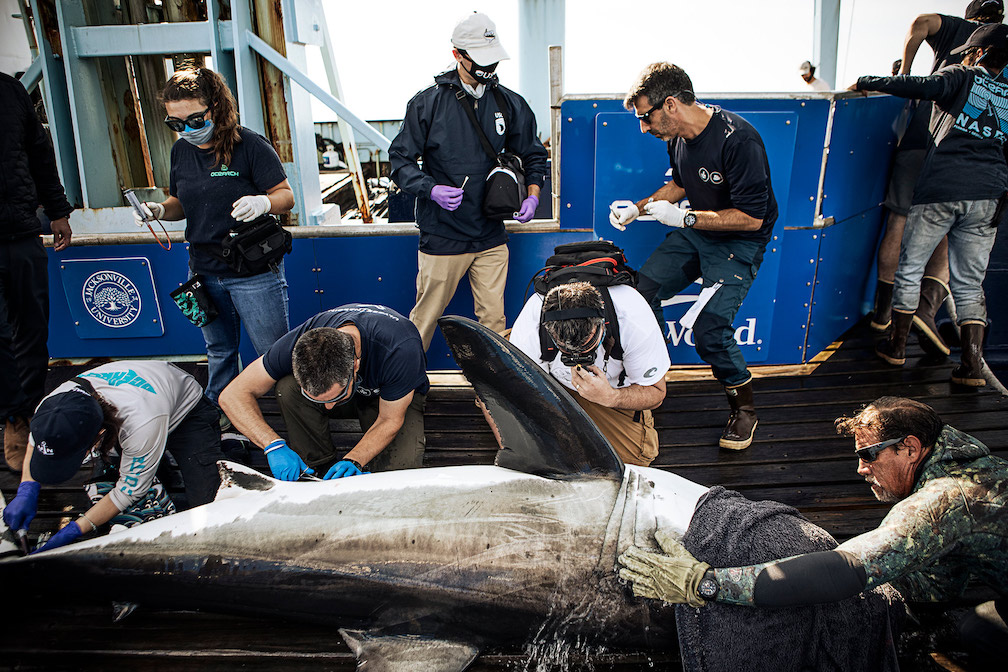
Ulysse Nardin accompanied Ocearch on a shark sampling and tagging mission and named this female shark Andromache, the brand’s newest ambassador.
On that expedition, Ocearch managed to study a female great white shark in its environment using a lift on the mothership that keeps the shark in the water while the samples are collected and the shark is tagged. Every shark caught is studied and released within a 15-minute time frame, making time incredibly valuable. Because of its relationship to Ocearch and to the oceans (and sharks in particular), Ulysse Nardin named that great white shark Andromach and declared her a Ulysse Nardin brand ambassador. The shark is named for the great princess of Thebe in Greek Mythology and symbolizes female strength and courage.
“Perhaps one of the most awe-inspiring moments of my life was being able to witness the Ocearch crew safely catch this beautiful white shark and to assist the scientific team with some sample analysis and eye measurement on the animal, says Francois-Xavier Hotier, President of Ulysse Nardin in the Americas. Inspired by the Iliad and the Odyssey, he named the shark Andromache. By naming her as a brand ambassador, Ulysse Nardin becomes the first Swiss watch brand to have a shark as an ambassador. Thanks to the Ocearch tagging, people can follow Andromache’s progress in the ocean, and recently she was spotted off the coast of North Carolina.
According to Chris Fisher, founder of Ocearch, the samples taken from one shark are being dispersed among 24 different multi-discipline scientists for a host of tests and studies. “We have a massive group of scientists trying to solve the puzzle of the apex predators. They are the balancers of the ocean and prevent second-tier predators from exploding in numbers and wiping out the food we need to eat and the food the other fish in the ocean need to eat. The water was my passion and I turned my passion into my profession, but we have to come at this with a sense of urgency and an expectation to win.”
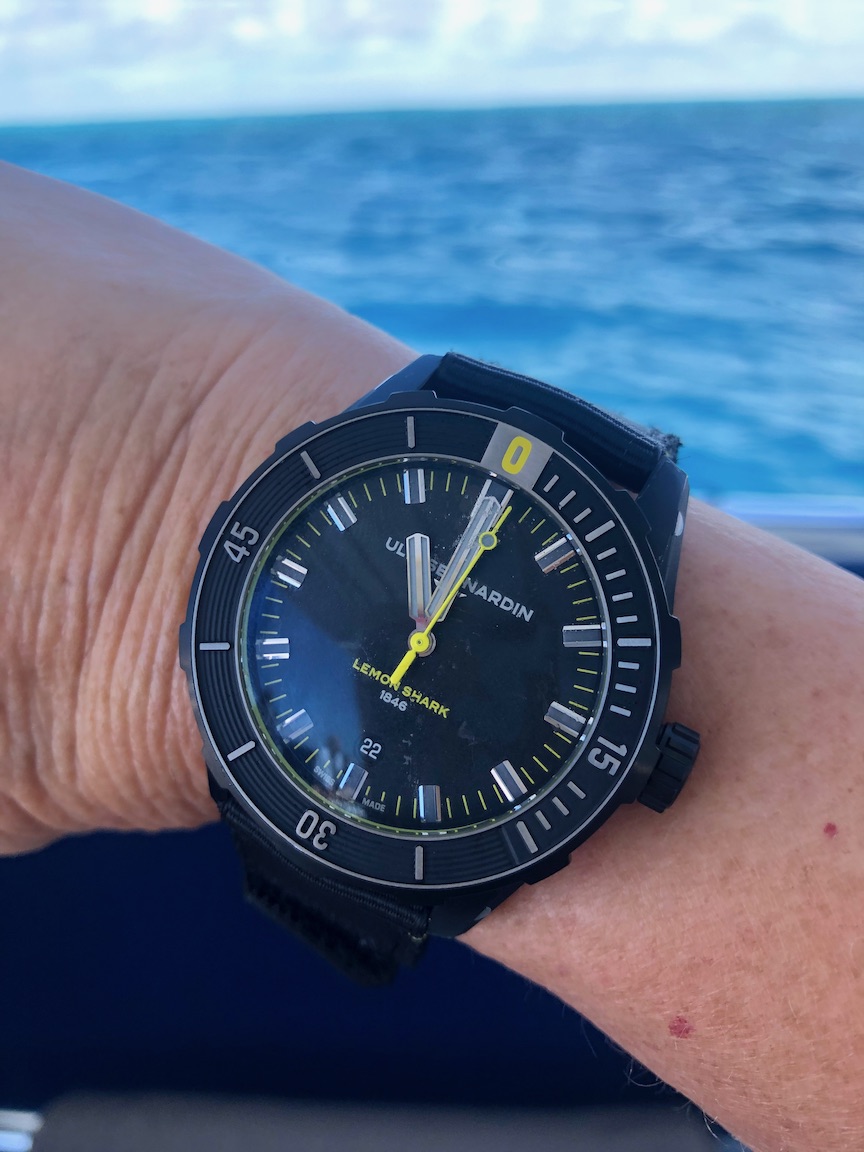
Ulysse Nardin Diver Lemon Shark retails for $7,300.
Ulysse Nardin and FIU
Continuing its dedication to the oceans, Ulysse Nardin also recently began working with the Florida International University’s (FIU) Medina Aquarius Program, which owns and operates the famed Aquarius Reef Base – the world’s only underwater research laboratory. Located 60 feet beneath the surface of the water in the Florida Keys National Marine Sanctuary, the Aquarius lab has been used by a host of organizations, including NASA, for various needs that range from serving as a simulator for small space capsules to enabling scientists to develop undersea technology and conduct unparalleled research.
Currently FIU is developing a new ultra-sophisticated lab to replace the current Aquarius, which is already decades old. According to Mike Heithaus, Dean of the College of Arts, Sciences & Education, the new facility may actually be made of clear acrylic so that scientists inside will be able to witness all of the sea life around them in full view.
“FIU is trying to ensure that the oceans stay healthy and we are trying to inspire the next generation of enthusiasts for underwater conservation,” says Heithaus. “Our faculty is truly dedicated to the study and preservation of marine ecosystems worldwide and the updated facility will enhance the scope and impact of FIU on research, educational outreach, technology development, and professional training.”
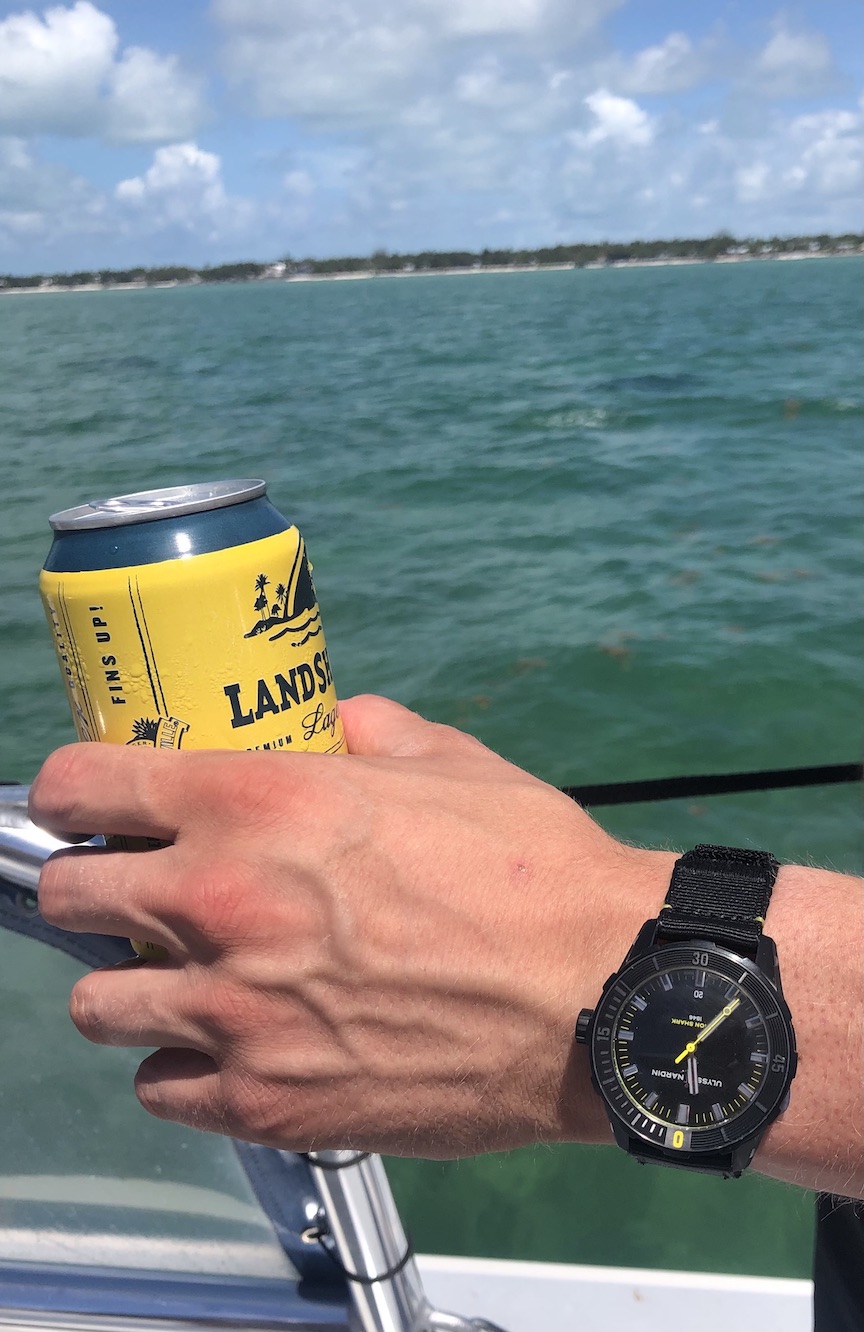
The return trip from snorkeling in the Florida Keys. Photo opp too perfect. Ulysse Nardin Diver Lemon Shark. (Pic: R. Naas)
(Portions of this article by Roberta Naas first appeared on Forbes.com.)





